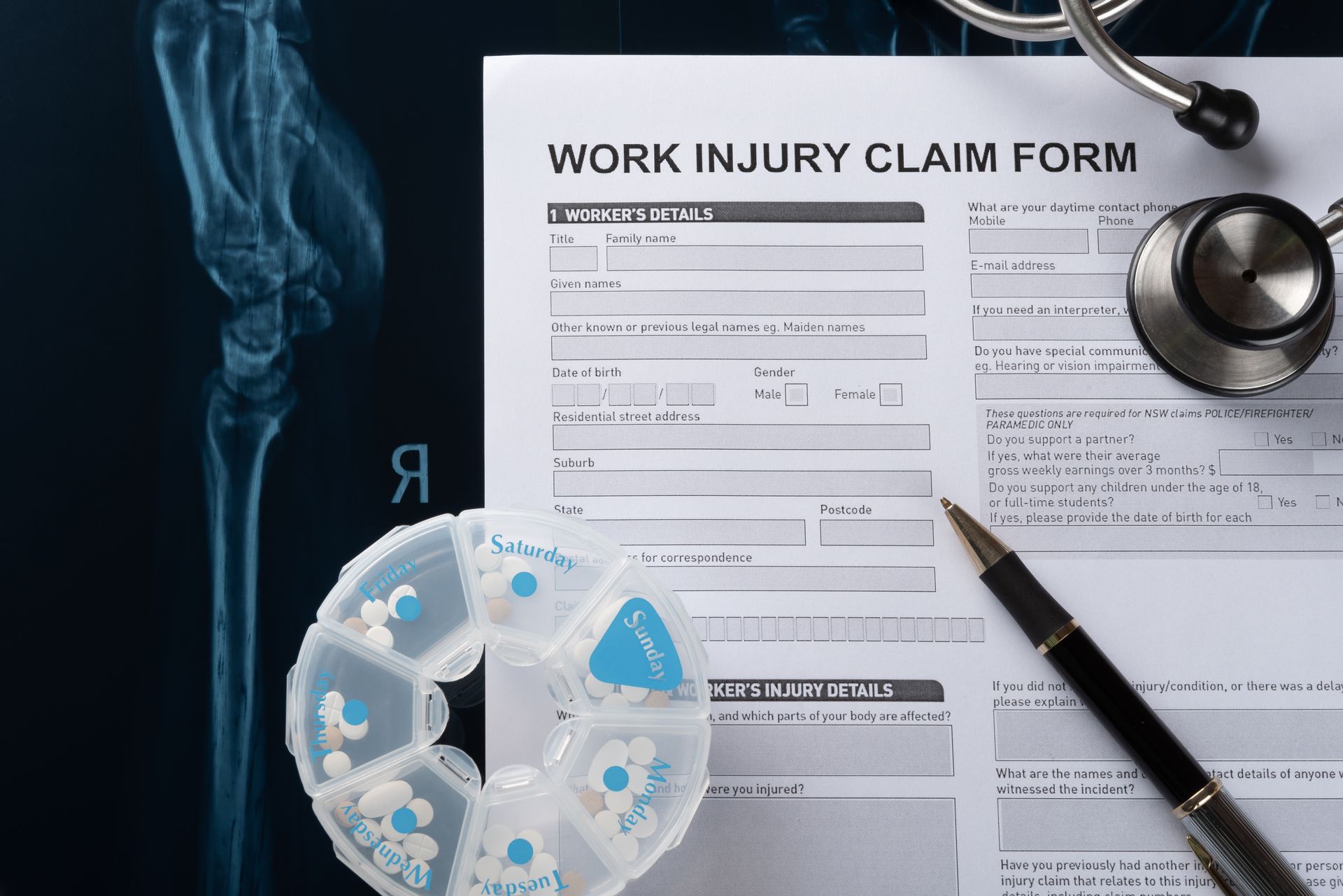Don't Call Christina Later, Call Christina Now
Follow us
How to File a Workers' Compensation Claim: A Step-by-Step Guide
Your Road to Recovery:
A Clear Guide for Filing a Workers' Compensation Claim

Sustaining an injury at work can be overwhelming. Between dealing with medical treatments and financial worries, it’s easy to feel lost. However, knowing how to file a workers' compensation claim can help ease some of the burden. Workers' compensation benefits are there to support you if you get injured while performing your job, covering medical expenses and lost wages. In this blog, we’ll walk you through the essential steps you need to follow to file a successful workers' compensation claim.
Your Road to Recovery:
A Clear Guide for Filing a Workers' Compensation Claim

Sustaining an injury at work can be overwhelming. Between dealing with medical treatments and financial worries, it’s easy to feel lost. However, knowing how to file a workers' compensation claim can help ease some of the burden. Workers' compensation benefits are there to support you if you get injured while performing your job, covering medical expenses and lost wages. In this blog, we’ll walk you through the essential steps you need to follow to file a successful workers' compensation claim.

Report the Injury to Your Employer Immediately
The first step in filing a workers' compensation claim is notifying your employer about the injury. In most states, you must inform your employer within a specific timeframe (usually within 30 days of the injury) to be eligible for compensation.
Why It’s Important:
Notifying your employer right away helps establish that your injury occurred during work and begins the claims process. Delaying or failing to report the injury could lead to complications or denial of your claim.
Report the Injury to Your Employer Immediately
The first step in filing a workers' compensation claim is notifying your employer about the injury. In most states, you must inform your employer within a specific timeframe (usually within 30 days of the injury) to be eligible for compensation.
Why It’s Important:
Notifying your employer right away helps establish that your injury occurred during work and begins the claims process. Delaying or failing to report the injury could lead to complications or denial of your claim.

Report the Injury to Your Employer Immediately
The first step in filing a workers' compensation claim is notifying your employer about the injury. In most states, you must inform your employer within a specific timeframe (usually within 30 days of the injury) to be eligible for compensation.
Why It’s Important:
Notifying your employer right away helps establish that your injury occurred during work and begins the claims process. Delaying or failing to report the injury could lead to complications or denial of your claim.


Seek Medical Attention
After reporting the injury, seek medical attention immediately, even if the injury seems minor. Some injuries, like concussions or internal damage, might not be immediately apparent.
Why It’s Important:
Your medical records will serve as critical evidence for your claim. Be sure to visit a healthcare provider who is authorized by your employer’s workers’ compensation insurance. Keep all receipts and medical records to document your treatment and recovery.

Seek Medical Attention
After reporting the injury, seek medical attention immediately, even if the injury seems minor. Some injuries, like concussions or internal damage, might not be immediately apparent.
Why It’s Important:
Your medical records will serve as critical evidence for your claim. Be sure to visit a healthcare provider who is authorized by your employer’s workers’ compensation insurance. Keep all receipts and medical records to document your treatment and recovery.

Fill Out the Necessary Paperwork
Once you’ve informed your employer and sought medical treatment, they should provide you with the necessary paperwork to file your workers' compensation claim. This will include forms to document the nature of the injury, how it happened, and your medical treatment.
Why It’s Important:
Accurate paperwork is key in processing your claim. Make sure to fill out all forms completely and accurately to avoid delays or denials. If you need help with paperwork, ask your employer or a legal professional for guidance.
Fill Out the Necessary Paperwork
Once you’ve informed your employer and sought medical treatment, they should provide you with the necessary paperwork to file your workers' compensation claim. This will include forms to document the nature of the injury, how it happened, and your medical treatment.
Why It’s Important:
Accurate paperwork is key in processing your claim. Make sure to fill out all forms completely and accurately to avoid delays or denials. If you need help with paperwork, ask your employer or a legal professional for guidance.

Fill Out the Necessary Paperwork
Once you’ve informed your employer and sought medical treatment, they should provide you with the necessary paperwork to file your workers' compensation claim. This will include forms to document the nature of the injury, how it happened, and your medical treatment.
Why It’s Important:
Accurate paperwork is key in processing your claim. Make sure to fill out all forms completely and accurately to avoid delays or denials. If you need help with paperwork, ask your employer or a legal professional for guidance.

File Your Workers' Compensation Claim
Submit your completed paperwork to the appropriate workers' compensation office. Depending on your state, this may be handled by your employer's insurance carrier or a state-run workers’ compensation board.
Why It’s Important:
Filing the claim properly ensures that your request is processed efficiently. Keep a copy of everything you submit for your own records, in case you need it later.
File Your Workers' Compensation Claim
Submit your completed paperwork to the appropriate workers' compensation office. Depending on your state, this may be handled by your employer's insurance carrier or a state-run workers’ compensation board.
Why It’s Important:
Filing the claim properly ensures that your request is processed efficiently. Keep a copy of everything you submit for your own records, in case you need it later.

Wait for Approval
Once you’ve filed your claim, the insurance company or workers’ compensation board will review your case. This process may take anywhere from a few weeks to a few months. If your claim is approved, you will receive compensation for your medical treatment and lost wages. If your claim is denied, you will have the option to appeal.
Why It’s Important:
Understanding the waiting process can help you plan financially while you wait. If your claim is denied, you’ll need to be prepared to take the next steps, including filing an appeal.
Wait for Approval
Once you’ve filed your claim, the insurance company or workers’ compensation board will review your case. This process may take anywhere from a few weeks to a few months. If your claim is approved, you will receive compensation for your medical treatment and lost wages. If your claim is denied, you will have the option to appeal.
Why It’s Important:
Understanding the waiting process can help you plan financially while you wait. If your claim is denied, you’ll need to be prepared to take the next steps, including filing an appeal.

Wait for Approval
Once you’ve filed your claim, the insurance company or workers’ compensation board will review your case. This process may take anywhere from a few weeks to a few months. If your claim is approved, you will receive compensation for your medical treatment and lost wages. If your claim is denied, you will have the option to appeal.
Why It’s Important:
Understanding the waiting process can help you plan financially while you wait. If your claim is denied, you’ll need to be prepared to take the next steps, including filing an appeal.

Appeal the Decision (If Necessary)
If your workers' compensation claim is denied, don’t panic. You have the right to appeal the decision. Contact a workers' compensation attorney who can guide you through the appeals process, ensuring you have the best chance of winning.
Why It’s Important:
Many claims are initially denied due to paperwork errors or lack of evidence. An attorney can help you strengthen your case and navigate the complex appeals process.

Stay in Communication with Your Employer and Healthcare Providers
Throughout the claims process, it’s essential to maintain open lines of communication with both your employer and healthcare providers. Keep them updated on your recovery and let them know if you need any accommodations for your condition.
Why It’s Important:
Constant communication ensures that everyone is on the same page and helps avoid misunderstandings or delays.
Stay in Communication with Your Employer and Healthcare Providers
Throughout the claims process, it’s essential to maintain open lines of communication with both your employer and healthcare providers. Keep them updated on your recovery and let them know if you need any accommodations for your condition.
Why It’s Important:
Constant communication ensures that everyone is on the same page and helps avoid misunderstandings or delays.

Filing a workers' compensation claim is an essential step to receiving the financial support you need after a work-related injury. While the process may seem complex, following these steps carefully will ensure a smoother and more efficient claims experience. Remember, if you run into challenges or need legal help, you can always reach out to an experienced attorney who specializes in workers' compensation claims. They can guide you through the process and ensure you receive the compensation you deserve.
If you’ve been injured at work and need assistance filing your workers' compensation claim, don’t hesitate to contact us today. We are here to guide you through the process and make sure you get the benefits you’re entitled to. Share this blog with others who may find it helpful!

Help others navigate the workers' compensation process! Share this comprehensive guide with friends, family, or coworkers who may need assistance filing a workers' compensation claim. Understanding the steps involved can make all the difference in receiving the benefits you deserve. Spread the knowledge and support those facing workplace injuries today!
Quick & Reliable
We are available 24/7 to Guide You to Better Health.
CALL CHRISTINA NOW is here to help 24 hours a day, 7 days a week, offering free and compassionate support. When you call us, we'll listen to your concerns, understand the specifics of your accident, help you find medical care for your injuries, and connect you with a professional who can advise you on the legal aspects of your situation.
CALL CHRISTINA NOW specializes in assisting with Lawyer and Medical Accident matters. If you've been in a car, motorcycle, or truck accident—or any other kind of accident—contact us today for trustworthy support.
DISCLAIMER:
CALL CHISTINA NOW isn't a law firm and can't provide legal advice, but we can refer you to the right attorney who can.
All Rights Reserved | Call Christina Now
Copyright © Call Christina Now Offers All Rights Reserved 2025
View Our Privacy Policy | Terms & Conditions | Disclaimer